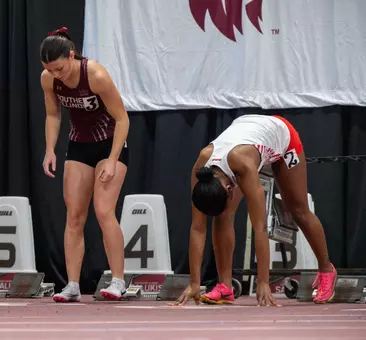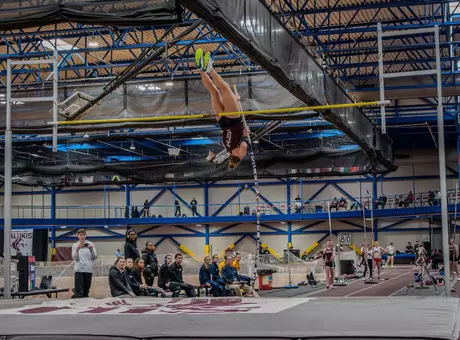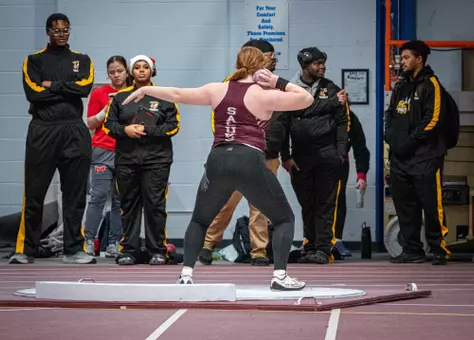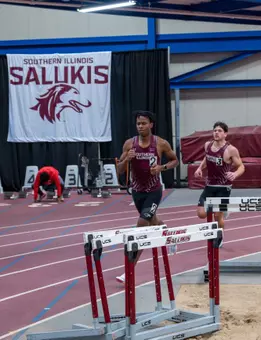Southern Illinoise University Athletics

Raske's breakthrough in men's track catapults her into elite company
04/27/2017 | 2:41:00 | Track and Field
Raske is one of just five women to lead a men's T&F team to a top-15 finish at the NCAA Indoor Championships after SIU's men finished in a tie for 14th in 2017.
While a freshman at Thornwood High School, SIU Director of Track and Field/Cross Country Kathleen Raske had her first, and only, female head coach. However, after the season, her head coach was replaced, as the salary of high school track and field coaches is often times dwarfed by the amount of hours worked. When it became clear that the new head coach wasn't on the same level as her predecessor, Raske reached an understanding that allowed her to train with the boy's team.
"We had an agreement that I was going to train with the guys," Raske said of her high school track and field career. "I trained with them for the rest of my high school career."
The proof was in the pudding. She took seventh in the 100-meter hurdles at the IHSA Class 2A state meet as a junior, and followed with a third place finish in the event a year later.
Her high school career is emblematic of Raske's rise through the coaching ranks, as she has often been one of, if not the only, woman seated at the figurative table. She represents an even smaller number of women who are the head coach of both men's and women's track and field teams, with just 22 women currently listed as the head coach of both their school's men's and women's track and field programs.
"Every time I'm at a national championship, a coaches convention, a coaches meeting, or even a committee meeting, I'm definitely a minority," Raske said. "I always look around the room and count how many women there are. There's always very few of us."
Consider- when Raske was hired as the Director of Track and Field/Cross Country at Sacramento State in the summer of 2003, she was one of just 13 women tasked with being the head coach of both the men's and women's track and field programs. That's 13 out of 206 NCAA Division I indoor track and field programs, or roughly 6%. Of those 13, few were outright hired, with most inheriting their position, either as programs were combined or through internal promotion.
"It's intimidating at first, to be honest with you," Raske said of being one of the few women head coaches of both a men's and women's program. "You're trying to get a job done while following a passion that you have. And you have to prove yourself. It's not prove yourself once, you have to prove yourself daily. And after 28 years of coaching, I continually have to prove myself every day. And it's not only to my athletes, but everybody else, every day."
After her Hall of Fame career at Southern Illinois came to an end, Raske's former head coach, Don DeNoon came calling with an offer to join his coaching staff. She jumped at the opportunity, and began a three-year stretch in which she often times worked two and three jobs to make ends meet. She was not only a part-time coach but she also completed the student-teaching requirement of her education degree while training as an athlete.
Raske credits DeNoon for not only giving her a start as a coach, but for being a friend who most often got the best out of his athletes and fellow coaches.
"Don DeNoon was a great mentor of women," Raske said. "He expected nothing but the best out of you. He challenged you every step of the way. But he was also a friend. He was someone you could talk to and someone who allowed you time and space to grow and develop."
Joining Raske on DeNoon's coaching staff was Beth Alford-Sullivan. Alford-Sullivan arrived in Carbondale after running at the University of Minnesota and, like Raske, was also in her first year as a graduate assistant coach at SIU. The two forged a close bond, the result of long hours spent at the track and in Davies Gym, where the women's athletic department was housed at the time.
"We slowly developed a friendship throughout those years," Raske said. "She was bright. She connected with the athletes and the athletes loved her. She brought a lot to the table and she was really good at what she was doing."
Alford-Sullivan went on to become the first female Director of Track & Field/Cross Country in Southeastern Conference (SEC) history when she was hired at the University of Tennessee in 2015. Raske wasn't surprised that her former colleague went on to so much success.
"She's definitely a barrier breaker just like I and so many other women have been," Raske said.
After her three-year stretch at SIU was finished, Raske spent five years as an assistant coach at Miami (Ohio). After eight years as an assistant coach, she knew it was time to try her luck as a head coach.
"I always had a love for the sport as an athlete, but once I started coaching, more and more I realized I was not only good at it, but I enjoyed it," Raske said. "And after spending eight years as an assistant, I knew I needed to become a head coach to figure out whether or not I was going to be a career coach and do this for the rest of my life."
In 1997, Raske was hired as the head coach of the women's track and field and cross country programs at Central Michigan. CMU Senior Women's Administrator Marcy Weston remembers her first impression of Raske as a coach.
"I first noticed Kathleen when she was at Miami (Ohio) at the MAC Championships," Weston said. "As a former coach, I noticed the way coaches interact with athletes. You can tell a lot by that, as well as how attentive the athletes are. The men and women Kathleen coached had laser focus when she spoke and their performance on the track usually reflected that. (Central Michigan's) coach retired and I mentioned to Kathleen that she should apply. She was the first to do so. Out of a pool of 30-to-45 applicants, she was one of four selected to interview for the position because her resume was so impressive. She got the position and did a really good job while she was here. Although she was the women's head coach, Kathleen actually worked with our men's team in her areas of expertise while she was here. The men wanted to work with her. Our men's coach was okay with it because the athletes were improving and getting better."
It didn't take Raske long to realize that becoming a head coach was the right decision.
"After my first year at Central Michigan, it was hook, line and sinker. I knew I was meant to be a head coach," Raske said.
In 2002, she led CMU to its first Mid-American Conference championship, and in doing so, was named MAC Coach of the Year, Great Lakes NCAA Regional Coach of the Year and Central Collegiate Coach of the Year.
The following year she was hired as the Director of Track and Field/Cross Country at Sacramento State and began a 12-year stretch in which her men's and women's teams combined to win 17 Big Sky team titles and became the only woman to coach a Division I men's team to five conference titles in NCAA history, in any sport.
Making her 12-year run at Sacramento State all the more impressive is that she won while using only five of the 12.6 scholarships that the NCAA allows for men's track and field teams and that prior to Raske's arrival, the Hornets had never finished higher than fourth at a conference championship.
In 2015, Raske returned to her alma-mater as the Director of Track and Field/Cross Country. At the time of her hiring at SIU, she was one of 23 women who were head coaches of men's teams. In her first season at SIU, her family-focused, team-oriented philosophy paid immediate dividends, as both the SIU men and women finished in the Top-25 at NCAA Championship meets during the same academic year for the first time in program history.
This past indoor season, the Saluki men finished in a tie for 14th place. It not only marked the best finish by SIU's men at the NCAA Indoor Championships since 1984, but it elevated Raske into elite company. She not only became one of five female coaches to lead a men's team to a top-15 finish at the NCAA Indoor Championships, but it is the highest finish by a woman coaching a men's team from a mid-major conference.
"She's attained so much success coaching both men and women because she doesn't settle and she continues to get better as a coach," Weston said. "Her success coaching men, especially with SIU's men doing so well at the NCAA Indoor Championships this year, is just another feather in her coaching cap."
Raske joined Lissa Olson (Purdue), Caryl Smith Gilbert (USC), Beth Alford-Sullivan (Tennessee, Penn State) and Vicki Mitchell (Buffalo) as the only women to guide a men's track and field team to a top-15 finish at the NCAA Indoor Championships. Saluki alumna Connie Price-Smith just missed joining the club this past season, as Ole Miss finished 16th.
While Raske is certainly both honored and humbled to be amongst such an esteemed group of women coaches, she can't help but want more.
"It makes me want to see more women up there," Raske said of hearing she is one of just five women to coach a men's team to a top-15 finish at a NCAA Indoor Championship. "That's my first initial gut reaction when I hear that, almost like 'come on ladies, let's go!'"
She continues to help the next generation of women coaches achieve success. She has had more than her share of former athletes join her in the coaching ranks, including Murray State head women's track and field coach Jenny Swieton, who ran for Raske at Central Michigan.
"I've mentored a lot of former athletes, and have given them a lot of materials and am always available," Raske said. "I always encourage former athletes to give back to the sport in any which way they can."
At Sacramento State, for instance, Raske started a "loop group" for young female coaches and administrators that met once a month in an effort to help provide professional skill development through workshops and seminars, ranging from resume building to work/life balance, leadership development, ethics and decision-making. The meetings were often times led by guest speakers, which ranged from the Director of Strategic Relationships of the National Alliance of Women's Coaches, Marlene Bjornsrud, to panel discussions with area athletic directors, head coaches and prominent administrators.
After all, Raske is only adding to a bridge that was built by the female coaches who came before her.
"I could not have made it this far in my career without my peers, my peer mentors and the women who came before me such as (USATF Director of Coaching) Terry Crawford," Raske said. "There's just no way I would've survived it. I've relied upon the women coaches that came before me to bounce ideas off of, to get advice from, and then to share similar experiences with them. It's been so very important to me, if I didn't have that inner-circle of support, I don't think I would have made it."












